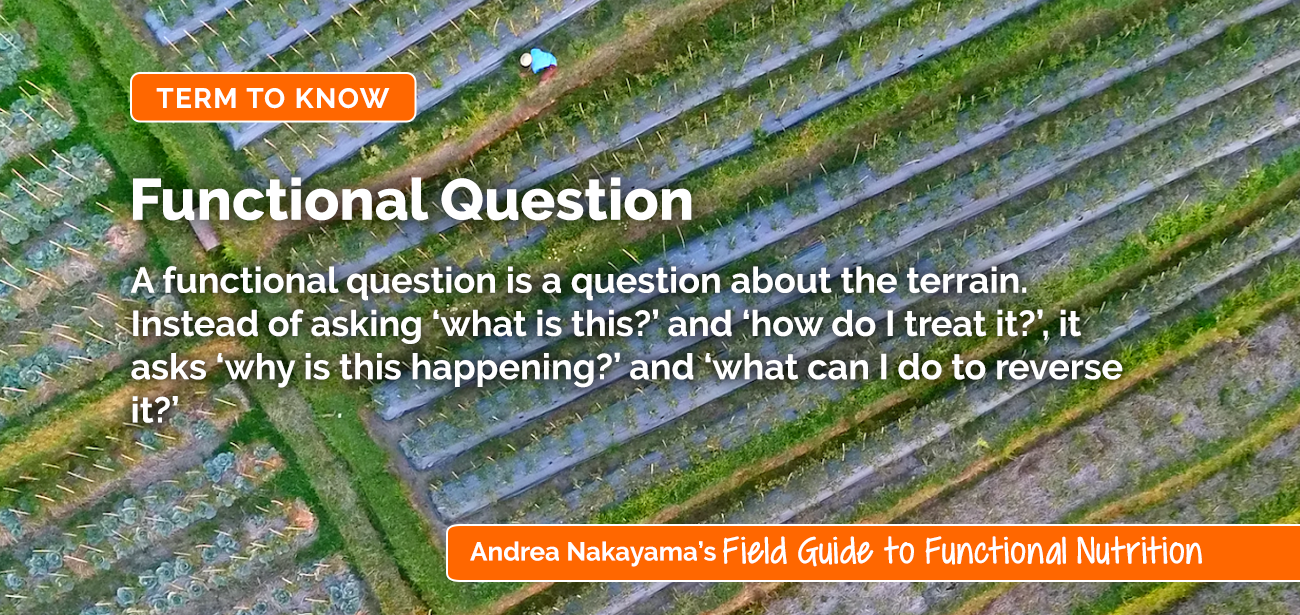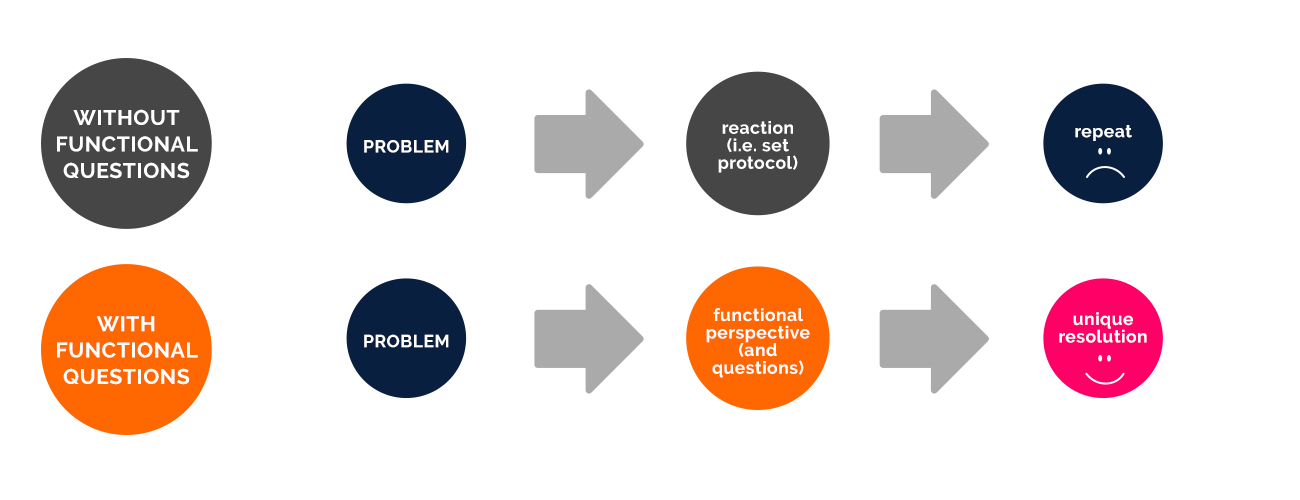Functional Question
Posted by Andrea Nakayama

Listen to this post instead!
A Functional question is a question about the terrain—it’s a question about the person. It’s not a question about the diagnosis.
A Functional question uses the principles of Functional empathy as well as the Functional Nutrition Matrix to make inquiries that lead to information about the bioindividuality of the client. Asking the Functional questions more readily leads to root cause resolutions and addresses what Dr. Dale Bredesen has termed the 36 holes in the roof. (Which of those holes might we need to plug?)
Here’s why…
Symptoms don’t arise in a vacuum.
Signs and symptoms only arise in an environment that has the perfect conditions for them to occur. Dr. Jeffrey Bland often says that “disease starts with dysfunction.” There are triggers and precipitating events that result in the appearance of a diagnosis.
Dysfunction often only results from myriad insults.
Those insults can be physical, physiological, psychological, spiritual, cognitive and more. These provocations may materialize in one individual over time or simultaneously, yet together they cloud the waters of care—until we learn to think Functionally.
It’s the coexisting conditions, manifesting together (and yet unique to the individual), that not only lead to a singular diagnosis, but also to the challenges that many of us practitioners experience in healthcare, particularly for those with chronic health challenges.
The Functional questions acknowledge that one-size-does-not-fit-all.
[bctt tweet=”A Functional question is about the person, not the diagnosis.” username=”AndreaNakayama”]
A Functional practitioner knows how to dig deeper, look upstream, and ask, “Why is the environment in this individual perfect for this particular symptom or condition?”
Once the terrain is understood, it can be shifted.
“A gardener sees the world as a system of interdependent parts—where healthy, sustaining relationships are essential to the vitality of the whole…A real gardener is not a person who cultivates flowers, but a person who cultivates the soil.”
– Karel Capek
Thinking Functionally is like being a “real gardener”—a gardener who cultivates the “soil” in an individual’s body.
I also like to think of the Functional question like a yogi thinks about mindfulness. Instead of an equation where a problem leads to a reaction, we insert a pause.
It looks something like this:
A question such as “what do I do for a client who has lupus?” is not a Functional question. A question like “where should I start with a client who is exhausted, is a new mom, is reacting to myriad foods and who was recently diagnosed with lupus?” starts to be more Functionally oriented.
Now see if you can turn your question into a Functional question.
Thinking functionally starts with true empathy. not just their diagnosis, —and it starts with knowing the right questions to ask.
EXPERIENCE A FREE TRAINING SERIES WITH ANDREA NAKAYAMA TO HELP YOU
Begin practicing functionally today!
MORE TO EXPLORE
You Might Also Like
From Healing to Clinical Mastery: Functional Nutrition and Wellness Coach Tita Nieves
In the world of healthcare, the pursuit of knowledge and innovative approaches to patient care is a never-ending journey. For health and wellness coaches and practitioners seeking to broaden their understanding and enhance their clinical skill set, the Functional Nutritional Alliance Full Body Systems program stands apart as a central hub for comprehensive and transformative […]
Read MorePaleo Banana Snickerdoodles
If you’ve been following the Paleo diet trend, you’ve probably come across recipes that incorporate bananas into various baked goods. Recently, I decided to conduct a little experiment and research to determine whether bananas, which are often viewed skeptically due to their perceived high sugar content, are worth the hype. First, let’s look at their […]
Read MoreThe Functional Nutrition Guide to Fats and Oils
Welcome to our comprehensive guide to fats and oils! This guide aims to provide you with valuable insights into the different types of fats and oils available, their sources, and how to make informed decisions about incorporating them into your diet. Fats and oils are more than just macronutrients; they are essential for overall health […]
Read MoreProtein: The Functional Nutrition Benefits of Nature’s Building Blocks
Protein: A fundamental element in Functional Nutrition As a key part of the Functional Nutrition Alliance’s Fat, Fiber, Protein principle for health and healing, protein deserves our attention and investigation. Protein is one of the essential macronutrients required by the human body to function properly. It’s composed of smaller units called amino acids, which are […]
Read More
